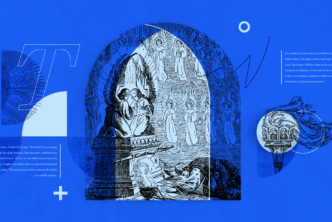What is the role of the Holy Spirit in worship? I often tell my students that my default answer to theological questions is, “It’s more complicated than you think.” A guiding framework for me in that regard is Gregory the Great, who describes the truths of Scripture as “both deep and shallow, in which a lamb can walk, and an elephant must swim” (Ep. Leandro 4.) There is a simplicity in Scripture that anyone can understand and yet a depth that no one can exhaust. In other words, simple answers exist, but there is always more depth. So it is with the Holy Spirit. We can say that the Spirit unites us with God and makes our worship effective. But there’s much more to that.
To transition from lambs to elephants, we need to lay a foundation first. What has been said about the Holy Spirit? What does the Spirit say about himself in the Scriptures he inspired? What can we determine about him from these statements? How does he relate to the other persons of the Trinity? Once we’ve begun to answer these questions, we’ve started our growth towards the deep end, and we can explore in more detail the activity of the Spirit in worship.
Forgotten God?
In some ways, the Holy Spirit has been neglected since the Council of Nicaea in 325, where his only mention in the initial creed regarded mere belief in his existence. This was rectified by Basil the Great in On the Holy Spirit, which was the groundwork for the updated creed at Constantinople in 381. Unfortunately, though, the Holy Spirit has continued to receive less attention than the other two persons of the Trinity. This trend led Francis Chan to name his short book on the Holy Spirit: Forgotten God: Reversing Our Tragic Neglect of the Holy Spirit.
This continued neglect needs to be remedied. As Basil himself said, “Not one of the words that are applied to God in every use of speech should be left uninvestigated.”1 Yet even Scripture focuses more on the Father and Son than the Spirit.
Divine Humility
This tension between our desire to concentrate on the Holy Spirit and Scripture’s comparatively lesser emphasis on him may indicate a distinguishing feature of the Holy Spirit. As the one who inspires Scripture (2 Tim 3:16; see also Eph 3:5; 1 Tim 4:1; 2 Pet 1:21), he quickly points to the other persons of the Trinity. This is perhaps the pneumatological equivalent of Jesus’ self-emptying (cf. Phil 2:5–11). The Holy Spirit is more interested in pointing us to Jesus than drawing attention to himself (cf. John 15:26, 16:13). Consequently, the Scriptures follow suit (cf. Gal 3:24).
Basil draws this out beautifully:
When through his illuminating power we fix our eyes on the beauty of the image of the unseen God, and through the image are led up to the more than beautiful vision of the archetype, his Spirit of knowledge is somehow inseparably present. He supplies to those who love to see the truth the power to see the image in himself. He does not make the manifestation from the outside, but in himself leads to knowledge.2
Not 3 gods
One caution we must consider when exploring the work of one person of the Trinity in distinction from the other two is that there are not three gods. This is simple enough, but when we make casual statements about the Trinity, we often mistakenly affirm things we don’t actually believe. So, one doctrine that we need to keep central here is the doctrine of inseparable actions. J. N. D. Kelly explains it this way (summarizing Augustine):
The Trinity possesses a single, indivisible action and a single will; Its operation is “inseparable.” In relation to the contingent order the three Persons act as “one principle,” … and “as They are inseparable, so They operate inseparably.”3
In other words, God acts as a united being, even when one person appears to be more visible to us. When God acts, all persons are involved and in perfect union both in action and desire.
Likewise, Athanasius says,
Being as a whole creative and productive; it is like to itself and in nature indivisible, and its activity is one. The Father does all things through the Word in the Holy Spirit. Thus the unity of the Holy Trinity is preserved.4
God acts as one, not as three. So, the Father and the Son act when the Spirit acts in anything. We may see the Spirit (the Son or the Father) as the primary actor, but God acts as a unity, not as three individuals. The Holy Spirit works in concert with the Father and Son but constantly directs our attention toward them.
This intra-Trinitarian activity is what we’re drawn into in salvation. In Jesus, we participate in the divine nature (2 Pet 1:4). Our union with Christ makes this possible, and the Spirit is identified as the primary actor in bringing that union into being (see 1 Cor 12:13; John 16:7–14; Eph 1:13–14). James B. Torrance puts it this way, “As Christ was anointed by the Spirit in our humanity to fulfill his ministry for us, so we are united by the same Spirit to share his ministry.”5
One place among many where we see this Trinitarian union of activity is in Ephesians 2. Jesus’ redemptive work grants us access to the Father by the Spirit (Eph 2:18). The Father planned this work and sent the Son to accomplish it. The Son accomplished that work and the Spirit applies it to us. To borrow from Tertullian, these actions are distinct but undivided (Against Praxeas, 12).
So, as we progress through the various activities of the Spirit in worship, we need to remember that the Father and the Son are also equally active. God acts as a unity. When the Spirit acts, the Son and Father act with him. There are not three gods acting separately. There are three divine persons cooperating in every act. This is eminently practical. As Graham Cole says,
There is thus a Trinitarian shape to our prayer life. The Father is approached through the Son by the Spirit. In this way we worship the Father in spirit and in truth (John 4:24): in “spirit” because we need to approach God, who is spirit, in a way that is in keeping with his nature; and in “truth” because without the self-disclosure of God in Christ our prayers are blind.”6
Fully God
In Christian theology more generally, and during worship in particular, it is important to recognize that the Spirit is indeed fully God. This is another common mistake—and why I insist on not using “it” when referring to the Holy Spirit, as though he were electricity or gravity. The Spirit is neither a force nor an impersonal entity.
He is called Lord (1 Cor 12:4–6; see also 2 Cor 3:17–18) and, as such, deserves the same worship as the Father and Son.7
The Spirit is present everywhere (Ps 138:7), but especially during creation (Gen 1:2), the baptism of Jesus (Matt 3:13–17; Mark 1:9–11; Luke 3:21–22; John 1:29–34), and he shares the singular divine name in the Great Commission (Matt 28:19).
One of the clearest passages to demonstrate the divinity of the Spirit is Acts 5:3–4:
“Ananias,” Peter asked, “why has Satan filled your heart to lie to the Holy Spirit and to keep back part of the proceeds of the land? … You did not lie to us but to God!”
Peter demonstrates that lying to the Holy Spirit is the same as lying to God.8
Additionally, when several passages from the Old Testament are referenced in the New Testament, they indicate that the Spirit is the one speaking in the Old Testament (Mark 12:36; Acts 1:16, 4:25; 28:25; Heb 3:7, 9:8, 10:15).
Basil summarizes it this way,
I testify to anyone who refuses the Spirit that his faith in the Father and the Son, which he cannot have without the simultaneous presence of the Spirit, will become fruitless for him. For he who does not believe the Spirit does not believe the Son, and he who does not believe the Son, does not believe the Father. “For he cannot say ‘Jesus is Lord’ except in the Holy Spirit”… Such a person is bereft of true worship, for he cannot worship the Son except in the Holy Spirit, and he cannot call upon the Father, except in the Spirit of adopted sonship.”9
Worshipping in the Spirit
During worship, the Spirit is engaged in at least four different activities.
1. His presence
The Spirit is among the people of God in a general sense beginning at creation (Gen 1:2; Job 33:4; Pss 50:13; 139:7; Hag 2:5). He occasionally rests in/on his people or a specific person for a specific reason (e.g., Ex 31:3, 35:31; Num 11:17, 11:25–29; 1 Chr 12:18–19; 2 Chr 24:20; Mic 3:8). This extends even to some Gentiles who recognize him in some way (Gen 41:38; Num 24:2).
God promises to give his Spirit more fully to his people, resulting in obedience, life, and blessing (Num 11:29; Ezek 36:27, 37:14, 39:29; Joel 3:1–2; Zech 4:6; Isa 11:2, 32:15; see also Matt 12:18 for Jesus as the fulfillment of this).
We are his temple (1 Cor 3:16–17; 6:19–20; Eph 2:22; see also John 14:17; 2 Cor 6:14–18; 1 Tim 1:14; 1 Pet 1:11). We’re told to be full of him (Eph 5:18), similar to how the temple was full of God’s presence and glory. This means that worship can occur anywhere because it is meant to occur in the Spirit. Basil puts it this way:
Scripture says “that you not bring your burnt-offerings in every place, but in the place which the Lord your God chooses” (Deut 12:13–14). What sort of thing is a spiritual burnt-offering? It is a sacrifice of praise. In what sort of place do we offer this? In the Holy Spirit.”10
He seals us, and we receive him as a first installment (2 Cor 1:22; Eph 1:13–14, 4:30). He is our guarantee (2 Cor 5:5) and the first fruit of our salvation (2 Thess 2:13). He is unpredictable and invisible (John 3:8; 1 Cor 2:10–16).
2. His actions
During worship, the Spirit leads and speaks to us, as he did Jesus and his followers (Matt 1:20; 4:1; Luke 2:25–27; 4:1; 12:12; Acts 8:29; 10:19; 13:2, 4, 15:28; 16:6; 21:11; Rev 2:7, 11, 17, 29; 3:6, 13, 22; 14:13; 22:17). Of these, Acts 13:2 is perhaps most instructive for our purposes.
While they were worshiping the Lord and fasting, the Holy Spirit said, “Set apart for me Barnabas and Saul for the work to which I have called them.” The Holy Spirit often speaks to us, but this passage suggests we should be especially attentive to his voice during worship.
During worship, he convicts sin (John 16:8–11; 1 Cor 14:25; 1 Thess 1:5; see Jesus performing a similar role in John 3:19–20; 8:46; 12:31).
He comforts us (Acts 9:31; see also John 14:26).
He reveals the deep things of God (1 Cor 2:10), providing the connection between humanity and God, which is necessary to receive the things of God (1 Cor 2:14). As Basil puts it,
The way, then, to knowledge of God is from the one Spirit, through the one Son, to the one Father. And conversely the goodness and holiness by nature and the royal dignity reach from the Father, through the Only-begotten, to the Spirit.11
He baptizes us into the Body of Christ (1 Cor 12:13).
He gives gifts (1 Cor 12; Heb 2:4) and makes us competent to be ministers of the new covenant (2 Cor 3:6).
He brings freedom (2 Cor 3:17). He produces fruit contrary to the flesh and isn’t opposed by the law (Gal 5:16–18, 22–25).
3. Our responses to him
We can receive (John 20:22; Acts 2:38; 4:31; 8:15–17; 10:44–45; 11:15–24; 19:6), grieve (Eph 4:30; see also Isa 63:10), and quench the Spirit (1 Thess 5:19; see also Heb 10:29).
We worship by the Spirit of God (Phil 3:3), which includes psalms, hymns, spiritual songs, and melodies in our hearts (Eph 5:18–19). Jesus tells the Samaritan woman that God desires worship that is “in spirit and truth” (John 4:24), and reveals that “living water” is in fact the Spirit (John 7). Our prayer is also in and through the Spirit (1 Cor 14:15; Eph 6:18; Jude 20). Graham Cole puts it this way:
The Spirit of the Son enables us to pray like the Son, as far as Paul is concerned in Romans and Galatians. Indeed the distinctive intimacy with which Jesus prayed to the Father, when he prays “Abba” Father, becomes our privilege because the same Spirit that animates his life of communion with the Father animates our own.”12
His descent and filling is connected with speaking in tongues (Acts 2:4; 1 Cor 14:2, 12; see also Acts 19:6; Eph 6:18).
4. His work within us
He bears witness with our spirit that we are children of God (Rom 8:16), allowing us to call out “Abba, Father!” (Rom 8:14–15; Gal 4:6).
He intercedes for us (Rom 8:26), strengthens us (Eph 3:16), unites us (Eph 4:3–4; Phil 2:1; contrast with Jude 19), responds to our prayers (Phil 1:19), and sanctifies us (1 Cor 6:11; Heb 10:29; 1 Pet 1:2).
Conclusion
The Spirit of God is fully divine, eternally co-equal with the Father and the Son. They always act as a unity, and thus dividing their activities is impossible. But just as dividing the persons is impossible while distinguishing them is not, dividing their actions is impossible but distinguishing them is not. So, as we’ve seen, the Spirit has an encouraging and strengthening role that connects us to the divine life. As such, his role in worship is absolutely vital. Without him, our worship would no longer be worship. As I mentioned, Basil the Great is one of the best voices on this topic. I’ll defer to him here at the end:
So, then, just as we speak of worship in the Son as worship in the Image of God the Father, so also we speak of worship in the Spirit as worship in him who manifests the divinity of the Lord. Therefore, in worship the Holy Spirit is inseparable from the Father and the Son, for if you are outside of him, you will not worship at all while if you are in him, you will in no way separate him from God—at least no more than you will remove light from the objects of sight. For it is impossible to see the Image of the invisible God, except in the illumination of the Spirit, and it is impossible for him who fixes his eyes on the image to separate the light from the image. The cause of seeing must be seen together with the things seen. And so, first we behold the radiance of the glory of God through the illumination of the Spirit, and, then, we are led up through the character to him of whom he is the character and identical seal.13
Related articles
- Holy Spirit 101: Who He Is, Why It Matters & More
- 5 Best Books on the Holy Spirit (A Doctor of Theology’s Picks)
- Is the Holy Spirit an “It”? 7 Proofs for the Spirit’s Personhood
- 16 Call to Worship Scriptures & How to Use Them
Related products
- Basil the Great, On the Holy Spirit, ed. John Behr, trans. Stephen Hildebrand, Popular Patristics Series 42 (Yonkers, NY: St. Vladimir’s Seminary Press, 2011), 27.
- Basil, On the Holy Spirit, 82.
- J. N. D. Kelly, Early Christian Doctrines, 5th ed., rev. (New York: Bloomsbury, 1977), 273.
- Athanasius of Alexandria, Serapion 1.28, quoted in John Behr, The Nicene Faith, vol. 2: The Formation of Christian Theology (Crestwood, NY: St. Vladimir’s Seminary Press, 2004), 247.
- James B. Torrance, “Christ in Our Place: The Joy of Worship,” in A Passion for Christ: The Vision That Ignites Ministry, eds. Gerrit Dawson and Jock Stein (Edinburgh: Handsel, 1999), 51.
- Graham A. Cole, He Who Gives Life: The Doctrine of the Holy Spirit, ed. John S. Feinberg (Wheaton, IL: Crossway, 2007), 236.
- See Basil, On the Holy Spirit, VIII.44–XXI.52; Thomas C. Oden, Life in the Spirit, vol. 3: Systematic Theology (San Francisco, CA: Harper San Francisco, 1992), 16.
- Basil links this passage to inseparable activity: “And let them consider what Peter said to Sapphira, ‘Why is it that you have agreed together to test the Holy Spirit?’ (Acts 5:9). ‘You have lied, not to men, but to God’ (Acts 5:4). These texts show that sins against God and against the Holy Spirit are the same thing. And so you should have learned the unity and indivisibility in every work of the Holy Spirit from the Father and the Son. Basil, On the Holy Spirit, 70.
- Basil, On the Holy Spirit, 11.27, 58; emphasis added.
- Basil, On the Holy Spirit, 101.
- Basil, On the Holy Spirit, 83.
- Graham A. Cole, He Who Gives Life: The Doctrine of the Holy Spirit, ed. John S. Feinberg (Wheaton, IL: Crossway, 2007), 235.
- Basil, On the Holy Spirit, 103.










